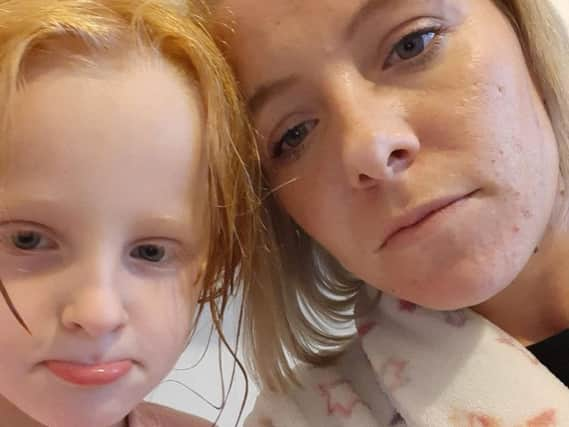Hospital 'sorry' after new mum spent two weeks in coma after giving birth


Rebecca Jones was readmitted to Royal Stoke Hospital days after giving birth to her third child Ruby.
But her "early warning scores" - which are meant to help clinicians decide how urgent any required intervention is - were miscalculated, according to a report by the trust which runs the hospital.
Advertisement
Hide AdAdvertisement
Hide AdShe was not reviewed by a senior doctor for nearly eight hours and did not receive the intravenous antibiotics she required to fight possible infection for more than five hours, the trust admitted.
Two days after her admission Rebecca, 28, was diagnosed with streptococcal A infection, sepsis and organ failure.
She was placed in an induced coma for nearly two weeks.
Following the problems, Rebecca and her family, of Talke, Stoke-on-Trent, Staffs., are calling on health professionals to be aware of the signs of sepsis.
It comes after the University Hospitals of North Midlands NHS Trust admitted delays in the treatment Rebecca received when she was admitted to hospital which breached its duty of care.
Rebecca gave birth to her daughter Ruby on March 7, 2015, at Stoke Royal Hospital and was discharged the following day.
On March 10, she visited her GP complaining of flu-like symptoms and pain.
Rebecca was referred to Royal Stoke Hospital for further tests.
She attended hospital just after 7pm, a root cause analysis report by the trust said.
Advertisement
Hide AdAdvertisement
Hide AdBut the results of early warning sign examinations were miscalculated, according to the report.
If the correct results were used it would have meant Rebecca should have been reviewed by a registrar within 30 minutes, the report said.
Rebecca was seen by a registrar at 4am the following morning.
Later that day she was diagnosed with respiratory failure and taken to theatre for investigations.
On March 12, she was she was diagnosed with streptococcal A infection, sepsis, acute respiratory distress, pneumonia and organ failure.
She was placed on a ventilator and in a medically induced coma. She was discharged from hospital in the middle of April.
The trust admitted staff miscalculated Rebecca's early warning signs of potential illness score and it failed to start Rebecca on a "sepsis pathway".
This is a plan designed to reduce the risk of patients developing the infection by 11pm on March 10.
Advertisement
Hide AdAdvertisement
Hide AdIt also admitted Rebecca required intravenous antibiotics by 11pm on March 10, but she did not receive them until 4.20am the following day.
Rebecca said: "It is incredibly difficult to look back on what happened following Ruby's birth and hard to take that there were delays in my treatment.
"More than four years on I'm still trying to come to terms with it all.
"That period should have been a special time for me to get to know Ruby, so it is hard to believe that I spent much of the time in a coma in intensive care.
"It was a complete nightmare and while the report into my care highlighted some issues, I just feel I deserve answers as to whether more could have been done to prevent everything that happened.
"I also hope that the NHS can learn lessons from my case so that no one else ever has to go through what I have."
Jade Elliott-Archer, the legal expert at Irwin Mitchell's Birmingham office who is acting for Rebecca, said: "We are hugely concerned by what Rebecca has gone through at what should have been a very happy time in her life.
"The problems that Rebecca suffered have had a significant impact on her in many ways, including sadly affecting how she was able to bond with her new daughter.
Advertisement
Hide AdAdvertisement
Hide Ad"During the course of our investigations a number of issues in the care Rebecca received have been highlighted.
"It is vital that the hospital trust now learns lessons from Rebecca's case to improve patient care.
"We know from working with many patients suffering from sepsis across the country how important it is to act on the signs as soon as possible to have the best possible chance of recovery."
Sepsis leads to shock, multiple organ failure and, potentially, death especially if not recognised early and treated promptly.
Signs include slurred speech, confusion, extreme shivering and muscle pain, passing no urine in a day, severe breathlessness and mottled or discoloured skin.